- Home
- Alex Scarrow
October Skies Page 4
October Skies Read online
Page 4
‘You think she’ll keep her word?’ asked Julian.
‘Not tell her boss?’ Rose nodded. ‘Yeah, I think so. I think we won her round.’
Julian unlocked the car and dropped his pack on the back seat. ‘Well, Rose . . . what do you think?’
She carefully placed her camera bag on the back seat, setting the folded-up tripod down beside it. ‘I think we might’ve hit the jackpot,’ she muttered, trying to keep an excited smile off her lips. ‘So we’re going to drop the other project then?’
‘Yup,’ he replied, pulling open the driver-side door and sitting down. ‘It’s a no-brainer,’ he added, squeezing long gangly legs into the space beneath the steering wheel.
‘No discussion about it?’
‘Nope.’
Rose sighed as she sat down heavily beside him, pulled the seat belt down and clicked it home. ‘Yeah, I really like the way this partnership thing works. You decide stuff, and I get to nod dumbly.’
Julian winced guiltily inside. Rose was a one-woman production studio; deft with a camera, a solid sound technician, a shrewd editor - he’d be buggered without her. She was the talent behind the films they had put together over the last few years; Julian was merely the vaguely recognisable TV face fronting their small company, Soup Kitchen Studios.
Business was ticking over, but it wasn’t great. They had a window of time to make their production company work. That window was his rapidly fading C-list celebrity status. The general TV-viewing public still recognised his face; some might even still remember his name . . .
The Cooke bloke . . .
Julian had reached what now seemed to have been his showbiz peak five years ago as a regular host on a late-slot, anarchical, current affairs quiz show. The panellists were the usual mixed bag of stand-up comedians, red-top columnists and publicity-hungry MPs. Julian Cooke had, arguably, been a household name for at least a couple of seasons. Prior to that, he had spent about fifteen years working in the BBC as a production assistant, then as a senior researcher. He couldn’t remember exactly how the transition from research-monkey to front-of-camera personality had occurred, but it had happened surprisingly quickly after he’d put together a tongue-in-cheek show reel in his spare time.
The quiz show never really took off, but it led to some work as a presenter on various off-the-wall documentaries. Round about the same time he’d stumbled across Rose - a media graduate knocking out amazingly satirical, biting, short pieces and uploading them onto YouTube. When he first saw her work she was already an established name in the Tube community, routinely getting hundred-thousand-plus views for each of her five-minute films.
For Julian, Soup Kitchen Studios was the right next step; an agile little studio with plenty of technical know-how and a recognisable figurehead and presenter, capable of knocking out TV content quickly and cheaply.
In rapid succession they made half a dozen fly-on-the-walls following around a succession of characters: a British National Party parliamentary candidate; a Muslim cleric recently returned from Guantanamo; a veteran soldier from Iraq attempting to rebuild his life (and his face); an ex-soap starlet trying to launch her pop career; the ‘ASBO King’, an objectionable hooded thug who enjoyed boasting and blustering about his criminal record; Dennis the Dentist, a charming old man who was serving an indefinite sentence for the serial murders of a dozen of his patients; and Tone, a guitar band from Reading on the cusp of success, but never quite managing to make it.
It was a great series: Uncommon People.
Since then he and Rose had failed to capitalise on the success, picking up shitty stocking-filler commissions like this one; a seedy poke at American trailer-trash and the weird crap they reckon they’ve seen. Rose already had a dozen digital tapes full of interviews they’d had with an auto mechanic, a waitress, several bored college kids and a couple of old guys in the woods who made slow-burn charcoal - swearing blind they’d picnicked with Sasquatch, made love to Jim Morrison, or seen the ghost of Elvis wandering the hills and woods around Blue Valley.
Julian sighed. It would be nice to make some serious TV again.
‘Yeah, we’re dropping that bloody project,’ he said, starting up the Prius.
‘Fair enough,’ Rose agreed.
CHAPTER 7
20 July, 1856
I should have written more in this dairy than I have. I look in here and find my last entry is more than four days old.
I shall make immediate amends.
So, we have travelled in this loose association for a while now, out of Fort Kearny. We are an interesting mix of people at this end of the train. Our guide, Keats, insists our contingent refer to itself as the ‘Keats Party’ since he has been employed as our trail captain. Rather than antagonise a man I fancy could skin and fillet me with one flick of his large ‘Bowie’ knife, I’m more than happy to go along with that.
Amongst our group I’ve found the most fascinating diversity of people you could ever hope to travel with. Our contribution to the long train of carts is just five wagons long, with myself, Keats and his Indian partner Broken Wing as the only members travelling without the encumbrance of one.
We have the McIntyres, a family of four whose journey west, so they tell me, started in New York, and before that, Cork in Ireland. Their tales of squalor, the overcrowded tenement buildings in New York, the desperate gang fights amongst groups of immigrants, sound quite grim.
Then we have another family, the Bowens, who hail from my home city; more specifically, from the East End. Just as grim a place as any I’ve seen in the Five Points.
The other two wagons are occupied by a dark-skinned family. I have spoken with the only one of them who knows enough English to manage a conversation: Mr Hussein, the head of the family. His oldest son, Omar, pilots the second wagon and also speaks a little English.
Finally, there’s Mr Weyland from Virginia, who has only a two-wheeled cart, few possessions, and a Negro woman with him. I don’t know if she is his property. I would prefer to think not. It is an uncomfortable feeling to witness one soul owned, like a shoe or a brush, by another. But, I have seen him be both respectful and tender with her. Perhaps, she is not his property.
Perhaps I’ll ask . . .
Ben sat back, resting his aching spine against the soothing cool oak lid of his medicine chest. He leaned all the way back and looked up at the star-spotted sky. Night-time in this wilderness was the sort of absolute darkness that he was still finding quite novel. The streets and terraced houses of London maintained an ever-present amber twilight of flickering gas and oil-fed lamps.
The wagons of their parties were drawn close together in a circular cluster, the oxen corralled securely in the centre. The Preston party wagons were drawn together in their own cluster thirty or forty yards away; not a huge distance, but far enough to clearly make the point that they wished not to interact any more than was absolutely necessary.
Keats was holding court around their campfire. Ben could feel the heat from where he sat, warming one side of him while the other side gathered goose bumps from the fresh night air.
‘. . . seen all kinds right across from Independence to Oregon, ’ Keats replied in answer to a question from Mrs Bowen. ‘The trick of it, ma’am, is to know your tribes, and know ’em well. You got some that are so goddamned friendly you wonder how they managed to survive so long. The other tribes? Well . . .’ Keats’s voice trailed off and he shook his head.
After a moment of silence, Mrs Bowen leaned forward. ‘Mr Keats?’
Intrigued, Ben carefully packed away his journal, pen and inkpot into his chest and joined the huddle of people around the glowing, warming flames.
‘Mr Keats, you can’t just say that and then leave us ’angin’ about,’ Mrs Bowen persisted and looked at the others gathered nearby, ‘can ’e now?’
He shrugged. ‘If it weren’t for it being mixed company, ma’am . . .’
Ben cleared his throat. ‘I think I’d like to know what we stand to face a
long the way, Mr Keats. Will it be friendly Indians or not?’
Keats’s hand cupped his bristly chin. ‘Well now, see that’s why you got me showin’ you the way through to the other side. Ain’t it? We’ll be passin’ through lands of maybe a dozen different tribes; Pawnee, Lakota, Cheyenne, Arapaho, Ute, Shoshone, Paiute, to name just a few.’ Keats looked at Ben. ‘Six, seven years ago, most Indians was friendly, back when the rush began. But they kinda learned a whole lot since then. They know it ain’t so smart riding in to greet wagon trains like ours. Too many bored settlers carryin’ guns and lookin’ for something to shoot at,’ he said, settling back against his saddle. ‘Ain’t that right?’ he asked Broken Wing.
The Indian nodded silently, puffing on his clay pipe and gazing distractedly at the flames dancing in front of him.
‘I remember, heard a story from a few years back,’ Keats continued, pulling out his own pipe and tobacco pouch. ‘There was this family . . . mother and father with more kids ’n they could be bothered to count. They stopped and made camp one evenin’. And then, like we do, they was up early the next morning whilst it’s still dark an’ off they set again. Only, it weren’t until they gone some miles before they realised they was down one child.’
Both Mrs Bowen and Mrs McIntyre gasped.
‘A group of men from the party was organised and they doubled back to try and find it. Led by the father, they headed back to where they was camped and then searched some trees nearby.’ Keats paused as he packed his pipe and then produced a match.
‘Now see, they found that little child,’ he said, then struck the match, held it to the bowl of his pipe and sucked. He took his time puffing, until the tobacco was well alight.
‘Well?’ asked Mrs McIntyre. ‘You were saying . . . the child?’
‘They found the child all right,’ Keats continued, ‘safe and well, being fed and played with by a group of young Pawnee warriors, would ya believe? Some say they was a raidin’ party looking to steal horses from the neighbouring Lakota. All tough young warriors these . . . but playin’ with the child. Them Indians had made camp right there where they found the child.’
Mrs Bowen smiled. ‘Them Indians don’t sound so bad after all, then.’
Keats puffed on his pipe and blew a cloud of smoke. ‘Camped right there over night, just so’s they could mind the child until the parents came back to get her. Well, that’s what some people say. But we’ll never really know.’
‘Why’s that, Mr Keats?’ asked Mrs McIntyre.
‘The father fired upon them. The others joined in. Killed most of them right there.’
There was a wary silence around the fire that popped and crackled, feeding hungrily on the buffalo chips.
‘I told you the story so’s you get the idea what them Indians have seen of us. An’ none of it is good,’ he said, shaking his head. ‘Thing is, they had about enough of us folk comin’ through, shootin’ their buffalo and lettin’ ’em rot, tossing aside our shit and spoils, burning their firewood, spoilin’ their creeks and pools . . . shootin’ at them for no other reason than they were within range.’ He shook his head. ‘They was real slow on the uptake at first. But they got the measure of us folk now.’
‘It sounds like you’re on their side, Mr Keats,’ said Mrs McIntyre, shooting a glance at Broken Wing, ‘not ours.’
‘Don’t get me wrong, m’dear,’ he replied, ‘I’ll shoot a Indian if I have to. Or a white man, for that matter.’ He turned to the others around the fire. ‘I’m just tellin’ you what you oughta know. These last few years, Indians started turnin’. Which is why you gotta be lookin’ at wagon trains of twenty and over now, if you want to make it across alive. Which is why you need the likes of me and Broken Wing to lead you folks safely across the way.’
‘So,’ ventured Ben, ‘the question still stands: what type of Indians are we likely to come across? Friendly ones? Or—’
Broken Wing snorted a muted laugh.
Keats chuckled. ‘Well, there ain’t no friendly Indians no longer, Lambert. Just real cautious ones, or real pissed ones. And you want to hope to God, young man, that we only run into the first kind.’
Mr Bowen, a broad-shouldered man who habitually shaved his head down to the wood and looked every bit the East End brawler, put an arm around his wife’s narrow shoulders.
‘Don’ worry, Molly, luv,’ he said, nodding politely at Keats, ‘I reckon we’ll be just fine with Mr Keats ’ere lookin’ out for us, won’t we?’
Keats nodded. ‘S’right, Bowen. I aim to lead you folks up a route I took last year. Takes us north of most other well-worn trails, more into Shoshone country than Ute as we cross.’
‘But will that take us longer?’ asked Ben.
Keats fixed his dark eyes on Ben and nodded. ‘Good question, young man. We’re late in the season. The only fools who set off now from Independence, or even Fort Kearny, would be damn stupid fools. My route’s a little longer, but a whole lot safer. We want to make it to the far side of the Rockies this side of September, an’ across them Sierra Nevada mountains before October hits us.’
‘But if we don’t . . . ?’ Mrs Bowen started to ask.
Keats’s salt and pepper eyebrows arched. ‘If we don’t make it across in time?’
She nodded, her eyes wide and anxious.
‘We will, Mrs Bowen, we will. Just as long as we push hard, and mind that you take good care of your oxen an’ grease your axles daily.’
Ben heard the scuff of several pairs of boots approaching through the darkness, and those already seated around the dwindling flames were joined by Mr McIntyre, Mr Hussein and his son, and Mr Weyland.
Keats nodded with satisfaction. ‘Seems like we got at least one person from each of our wagons here . . . good. I guess now’s as good a time as any other. One rule you folks should know up front. We ain’t gonna stop for nobody.’ Keats looked at each of them in turn. ‘Whatever happens - oxen die in their harness, wagon tongue snaps, sickness hits a family, any accidents . . . the rest of us gotta keep rollin’ whatever.’
‘What about those others?’ asked Mr McIntyre, gesturing towards the Mormon camp.
Keats looked across at the wagons of the Preston party. ‘Hell, it’s up to them. They got their own trail captain, that Preston fella. He can take my advice or leave it, up to him. But you folks hired me as your trail captain, so you follow my rules, understand? ’
‘You’re serious?’ asked Ben. ‘You’d ask us to leave someone behind? But they might die.’
‘Oh yeah.’ The old man nodded. ‘Anyone left behind will die, Lambert. And you people are gonna start seein’ the graves by the trailside pretty soon - the left-behinds. Those’re the real stupid folk who had horses pullin’ their wagons ’stead of oxen. The stupid folk who ignored a creaky axle a day too long. The stupid folk who got their head blasted off ’cos some dumb ass was ridin’ by with his rifle loaded and restin’ cross-saddle.’
There was a sombre silence punctuated only by the crackle of the fire.
‘The elephant can kill in many diff’rent ways, folks. Sweep you off the trail with one blow of his trunk. You be mindful of him. You see him . . .’ Keats took a long pull on his pipe and blew out a cloud of acrid smoke. ‘You see him, near or far, that’s the time to turn round.’
‘Keats, you’re scaring my missus,’ said Bowen.
‘Good. Cause we got plenty to be scared ’bout, not least of all is the weather.’
‘The weather’s been fine, Mr Keats,’ said Ben. ‘Lovely, in fact.’
Keats laughed. ‘Fine right now, Lambert, but we still yet to beat it.’ The old guide nodded westwards. ‘That’s the thing we all gotta be mindful of though, folks. We don’t beat the snow in those Sierras, then we’re in big trouble.’
CHAPTER 8
Saturday
MKNBC NEWS studio, Utah
‘I like to think I speak for the hard-working man on the shop floor, those regular Joes who pay taxes year in, year out, don’t ask for favo
urs, don’t run around breaking the law . . . to quote Andrew Jackson, the very sinews of this nation of ours,’ he said, offering his host a polite but sincere nod.
‘I think in recent years we’ve lost sight of the quiet guy. The guy that just gets on with it, doesn’t complain about the cards he’s been handed, doesn’t try and find someone to sue if everything isn’t going quite right for him.’
Patricia Donnell offered him a calculating smile. ‘Which sounds to me, and I’m sure to our viewers, Mr Shepherd, a very noble sentiment. But what I’m trying to understand, what I’m trying to get my head around, is where you really sit in the political spectrum. You see, there will be those who look at your background; an influential family, old money in property and banking, your strong Christian views, and ask themselves whether they’re looking at another Republican candidate by a different name.’
‘Two things, Patricia. Two things you got wrong right there,’ he said, working carefully to keep his voice measured and calm and his pace deliberate and even.
‘My faith, as you well know, is Church of Latter Day Saints. I am not a Baptist, nor an Evangelical, nor Seventh Day Adventist. I am a Mormon. There’s a big difference there, Patricia. Secondly, yes . . . I come from a privileged background, but we’ve all worked for that. Myself, my father, my grandfather - through generations of putting our backs into it, we’ve rightly amassed our wealth. And what’s wrong with that? This is America. But, because of that,’ he said, raising a finger to stop her cutting in, ‘because I understand what work is, I truly understand the work ethic, that a man’s toil deserves to be rewarded, from the guy operating the factory-floor machine, to the guy sorting letters in the post room, to the shift supervisor. I’m not a Republican candidate.’
Patricia shrugged. ‘You’re making the right noises for the average Republican voter.’
He sighed and shook his head. ‘I’m offering something new, something different. A new realism - common sense politics. This nation has been strangled by the shared monopoly of Democrats and Republicans. The man I’m talking directly to . . .’ His eyes flickered to the camera in front of them. ‘. . . is fed up with looking at Washington and seeing this tug of war once every four years between two groups of people who, in fact, differ very little. I mean, these guys are in the pockets of the same lobby groups; they only seem to care about prolonging their terms in office. Meanwhile, out there in the real world, there’s problems need fixing.’

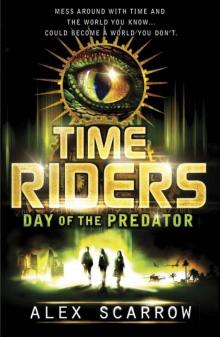 Day of the Predator
Day of the Predator Ellie Quin Book 3: Beneath the Neon Sky
Ellie Quin Book 3: Beneath the Neon Sky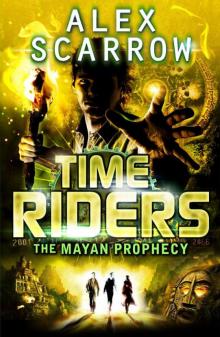 The Mayan Prophecy
The Mayan Prophecy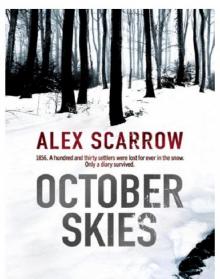 October Skies
October Skies Ellie Quin Episode 4: Ellie Quin in WonderLand (The Ellie Quin Series)
Ellie Quin Episode 4: Ellie Quin in WonderLand (The Ellie Quin Series)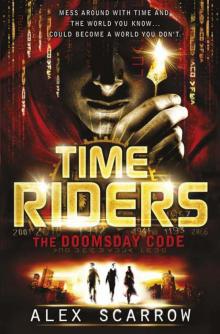 Time Riders
Time Riders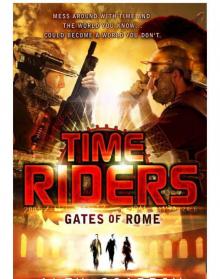 Gates of Rome
Gates of Rome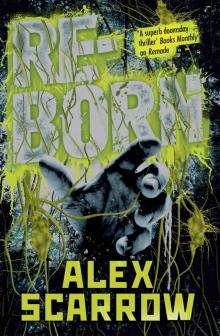 Reborn
Reborn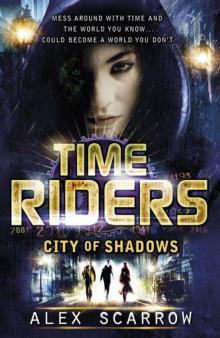 City of Shadows
City of Shadows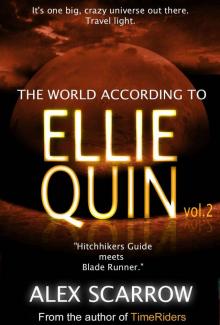 Ellie Quin Book 2: The World According to Ellie Quin (The Ellie Quin Series)
Ellie Quin Book 2: The World According to Ellie Quin (The Ellie Quin Series) Ellie Quin Episode 5: A Girl Reborn
Ellie Quin Episode 5: A Girl Reborn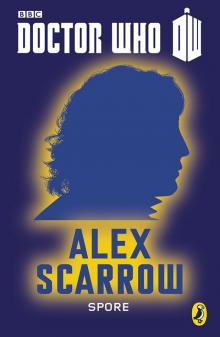 Spore
Spore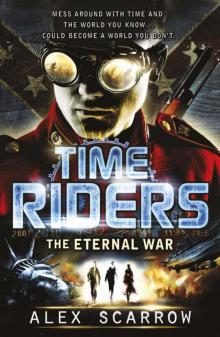 The Eternal War
The Eternal War Last Light
Last Light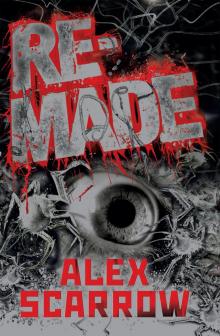 Remade
Remade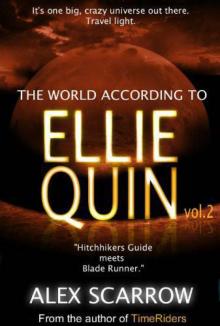 Ellie Quin Book 2: The World According to Ellie Quin
Ellie Quin Book 2: The World According to Ellie Quin Ellie Quin Book 3: Beneath the Neon Sky (The Ellie Quin Series)
Ellie Quin Book 3: Beneath the Neon Sky (The Ellie Quin Series)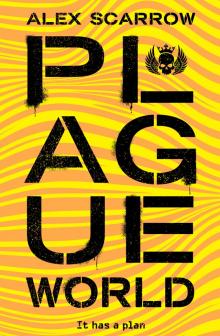 Plague World
Plague World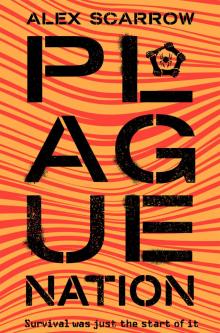 Plague Nation
Plague Nation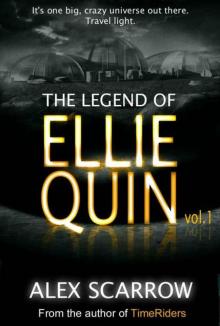 Ellie Quin Book 01: The Legend of Ellie Quin
Ellie Quin Book 01: The Legend of Ellie Quin Ellie Quin - 04 - Ellie Quin in WonderLand
Ellie Quin - 04 - Ellie Quin in WonderLand No Escape
No Escape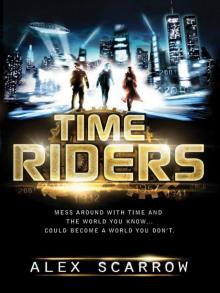 TimeRiders
TimeRiders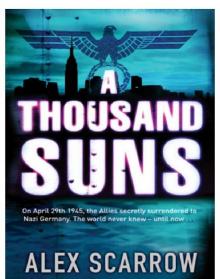 A Thousand Suns
A Thousand Suns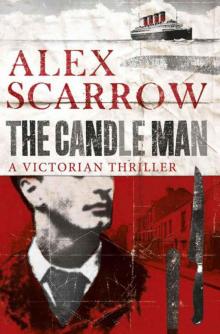 The Candle Man
The Candle Man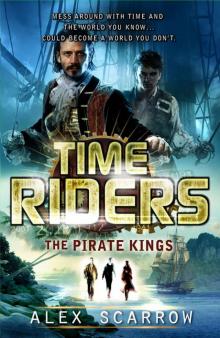 The Pirate Kings
The Pirate Kings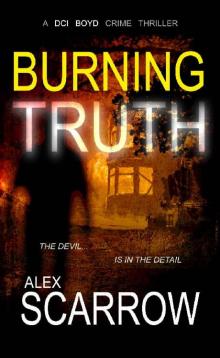 Burning Truth: An Edge-0f-The-Seat British Crime Thriller (DCI BOYD CRIME THRILLERS Book3) (DCI BOYD CRIME SERIES)
Burning Truth: An Edge-0f-The-Seat British Crime Thriller (DCI BOYD CRIME THRILLERS Book3) (DCI BOYD CRIME SERIES)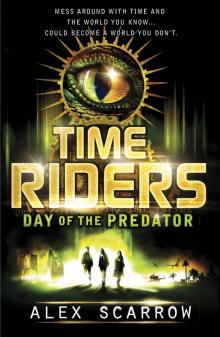 Day of the Predator tr-2
Day of the Predator tr-2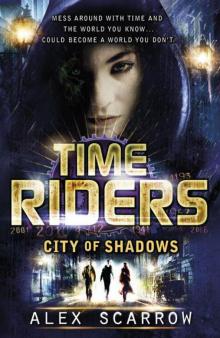 City of Shadows tr-6
City of Shadows tr-6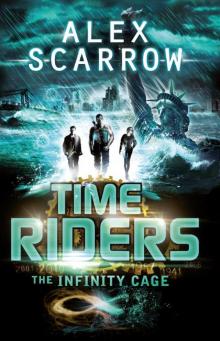 TimeRiders: The Infinity Cage (book 9)
TimeRiders: The Infinity Cage (book 9)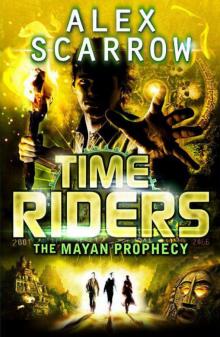 The mayan prophecy (Timeriders # 8)
The mayan prophecy (Timeriders # 8)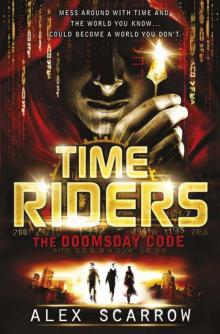 TimeRiders: The Doomsday Code (Book 3)
TimeRiders: The Doomsday Code (Book 3)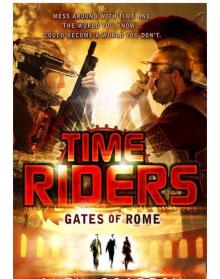 Gates of Rome tr-5
Gates of Rome tr-5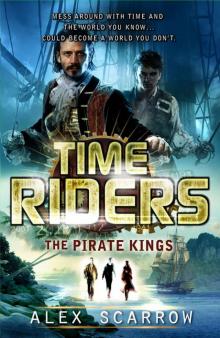 TimeRiders: The Pirate Kings (Book 7)
TimeRiders: The Pirate Kings (Book 7)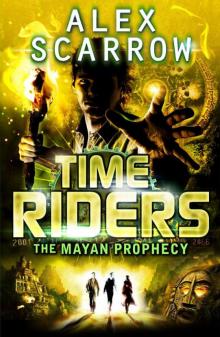 TimeRiders: The Mayan Prophecy (Book 8)
TimeRiders: The Mayan Prophecy (Book 8)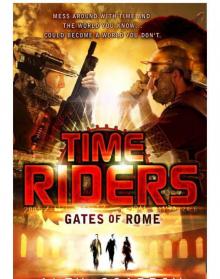 TimeRiders 05 - Gates of Rome
TimeRiders 05 - Gates of Rome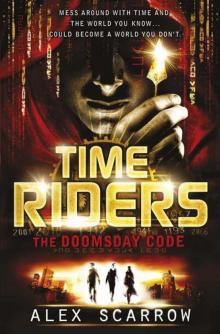 The Doomsday Code tr-3
The Doomsday Code tr-3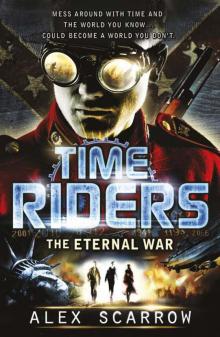 The Eternal War tr-4
The Eternal War tr-4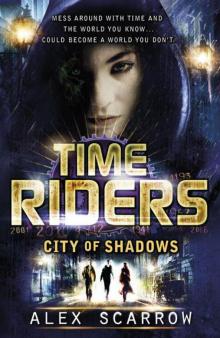 TimeRiders: City of Shadows (Book 6)
TimeRiders: City of Shadows (Book 6)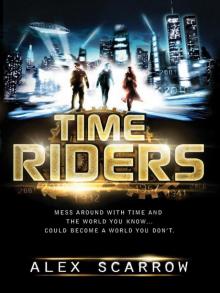 Time Riders tr-1
Time Riders tr-1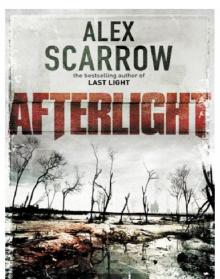 Afterlight
Afterlight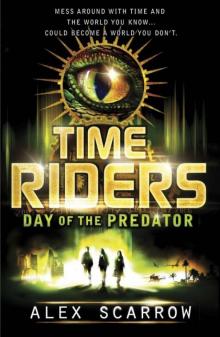 TimeRiders, Day of the Predator
TimeRiders, Day of the Predator Plague Land Series, Book 1
Plague Land Series, Book 1